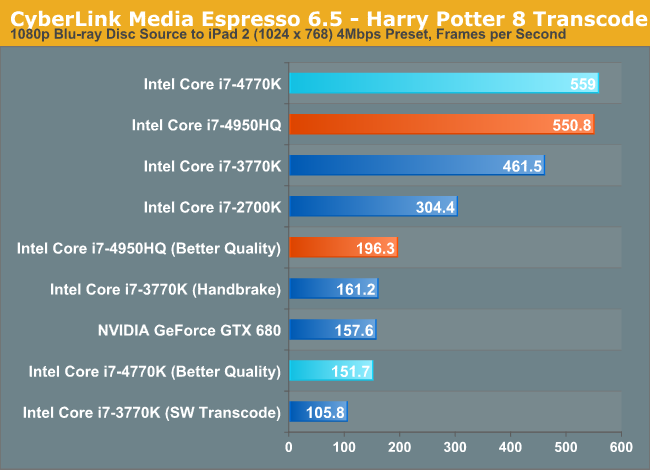The Haswell Review: Intel Core i7-4770K & i5-4670K Tested
by Anand Lal Shimpi on June 1, 2013 10:00 AM ESTQuick Sync Performance
With more graphics EUs under the hood of all desktop Haswells (at least those launching today), Quick Sync performance improves a bit over Ivy Bridge. Intel claims to have focused heavily on improving the quality of Quick Sync transcodes however in my testing I saw a slight regression in quality. I didn’t have a ton of time to dig further to find out what’s going on but I plan on doing so post-Computex. Update: It looks like I wasn't alone in seeing an image quality regression. Haswell QSV image quality is worse than on IVB as Ganesh found.
The other big news is Handbrake now officially supports Quick Sync, something Ganesh will be testing with his HTPC look at Haswell.
Needless to say, Quick Sync performance is better on Haswell than on Ivy Bridge. And it’s even better if you happen to have a Haswell with a 128MB L4 cache.











210 Comments
View All Comments
Iketh - Sunday, June 2, 2013 - link
Your post is so ignorant that you should have posting privileges revoked.gryer7421 - Monday, June 3, 2013 - link
? Everyone knew this was intels piledriver revision.Donkey2008 - Monday, June 3, 2013 - link
When you are "cynical" you will "see" nothing "good" in anything.jonjonjonj - Tuesday, June 4, 2013 - link
i agree. its annoying that intel is designing their desktop cpu's to also compete with arm in mobile. why can't intel develop 2 different versions or architectures? is power efficiency the limiting factor and if TDP and power was no concern how much better could intel do?i personally don't care about power on my desktop as long as the performance justifies it. desktop cpu's should be about performance not saving power.
Death666Angel - Tuesday, June 4, 2013 - link
How can you be disappointed when Haswell gives you exactly what was promised? It seems like you should have adjusted your expectations. Or you just like to be disappointed.I'm not surprised by these numbers, they are what was expected. I'm still running an i7-860 @3.8GHz and when I get enough money I'll upgrade to an i7-4770k and hopefully be able to run it at 4.5GHz, give or take some (water cooling setup here). Maybe IVB-E if it tests well and money is not too tight.
Anand really needs a Lynnfield for comparisons, because the i7-9xx was geared towards people running the enthusiast platform, whereas all the other CPUs tested here are geared towards mainstream high end.
ninjaquick - Wednesday, June 5, 2013 - link
Haswell at 1.8 GHz is a completely different story to any of this... Mark my words: You will never see 3.4 GHz parts in tablets, ever.However, a 30% improvement in efficiency can be roughly translated to a 30% increase in performance per watt. That is massive in tablets.
Sure, it won't be a 3.4 GHz tablet part, but it will also be a bit quicker than a 1.6 GHz tablet part.
mkygod - Wednesday, September 18, 2013 - link
Of course they are comparing to older CPUs because the article made a point to say that it does not make a whole lot of sense to upgrade from Ivy Bridge. But still, 5-10% faster compared to Ivy bridge is pretty good i would say for the extra ~$10-20 dollar difference.boe - Monday, June 3, 2013 - link
Its just as good as ivy bridge - pretty much ivy bridge pretending to be something new.Dnann - Friday, June 14, 2013 - link
It seems that not as good as I was imagining. :Orudolphna - Saturday, June 1, 2013 - link
Honestly, the best part of the review was the comparisons to older chips. It's entertaining to see just how terrible the Pentium 4 was in hindsight.